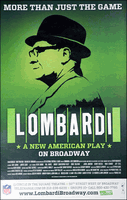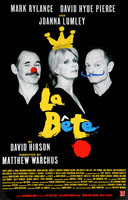LOMBARDI ** out of ****
Circle in the Square on Broadway
Sometimes, the most fascinating people can be terrible interviews. Either they're too protective of their image or -- outside the area of expertise that has made them famous -- they're simply boring. Whatever the case, complex and intriguing people sometimes just don't give good quotes. That seems to be the problem with the ornery (but lovable!) football coach Vince Lombardi in this new bio-play by Eric Simonson (director of A Note Of Triumph, the Academy Award winning short film on legendary radio talent Norman Corwin).

It's 1965 and Lombardi (a fine Dan Lauria of TV's The Wonder Years) is in the midst of his remarkable revival of the Green Bay Packers. But a "hatchet job" in Esquire has Lombardi licking his wounds, wary but ready to cozy up to a cub reporter from Look magazine that promises to do a much friendlier profile. It's amusing to see how much of a lackey the reporter feels: he stays with Lombardi and Lombardi's wry wife (an amusing Judith Light of Ugly Betty and Who's The Boss), stands where he's told to stand, sort of avoids the questions he's told to avoid and generally acts like its a privilege to be in the presence of the Great Man.
But, again, there's that problem of interviews. Every time Lombardi says something interesting, he puts it off the record. His wife is hilariously blunt, but she's savvy as well and mostly interested in protecting her husband, sometimes from himself. (Lombardi can be gruff, to say the least.) And a play structured around a reporter spending a week with a subject breaks the crucial rule of fiction: show, don't tell. Instead, almost all we get is the tell.
Shadows in Lombardi's life are revealed, such as a son who feels overshadowed by his dad and a brother who lives in San Francisco, hates football and loves to shop. (Are these supposed to be related?) And clearly when Lombardi is focused on an upcoming game (which is always), he's not much fun to be around. The hapless reporter (Keith Nobbs in a thankless role) just seems in the way.
Then, out of nowhere, we actually see Lombardi doing his job and the fascination that the man holds is clear. He rips apart two players for arriving at camp early: the happy go lucky Paul Hornung (a charming Bill Dawes) and the slow but sincere Jim Taylor (Chris Sullivan). Just when you feel his wrath, Lombardi turns on a dime and woos them with kindness and tough love. Suddenly, after endless talk describing him as a coach and statistics about what he's accomplished, we actually see Lombardi being a coach and it's genuinely intriguing and dramatic.
This happens again when Lombardi upbraids Taylor again and Taylor stands up for his right to be represented by an agent. The dance of a coach -- father figure and tyrant to the players but also answerable to the owners and yet wanting to do right by his men who go into battle for him week after week -- is revealed again, not through a question and some stock answer, but by actually watching him at work.
That's the fatal flaw in Lombardi. The entire play is structured around a reporter digging up info and asking questions. Lombardi isn't famous for answering questions, he's famous for being a football coach. And when we find ourselves bored stiff by the reporter's crisis of conscience, we know it's really gone out of bounds. If the play had focused on one week of preparing for a game and dumped the hoary notion of a reporter as a device to reveal the Truth, it might have had a shot.
Lauria and Light are both pros, who land every joke with precision. Lauria's pep talks to the team aren't very inspiring, in part because he's talking to the audience instead of the players, but his stormy personality comes across well. Light is even better as his woozy but perceptive wife; it would be great to see her again in a more demanding role and a better play. Nobbs hasn't much to do, but the three players (which also includes Robert Christopher Riley as Dave Robinson) are appealing in their all too brief turns.
Director Thomas Kail and projection designer Zachary Borovay make clever use of the Circle in the Square dimensions by projecting video right onto the floor of the stage itself. And for a change the challenge of the space keeps things interesting. Scenes that might have been plainer on a standard stage are at least spiced up by having the couch rotate in 360 degrees so everyone gets a look at the actors sitting on it. Dramatically the rotation is pointless but, hey, it's something to watch -- kind of like the cheeerleaders during a game when you're rooting for your team but know they're not going to make it into the end zone.
LA BETE ** 1/2 out of ****
Music Box on Broadway
I missed the original production of La Bete but dimly recall the reviews. I fear I'm repeating them when I say that this comedy in rhymed verse does an all-too effective job in creating a boor who outstays his welcome. That's not quite the case with Mark Rylance, perhaps my favorite actor working in the theater right now. He and David Hyde Pierce and a very effective Joanna Lumley have delicious fun delivering the constant flow of zingers, word plays, puns and insults embedded like shrapnel in David Hirson's overflowing dialogue. When Rylance as Valere bursts into the room of actor/playwright Elomire (Pierce) and begins to talk and talk and talk, the audience is happily braced for what is essentially a 20-minute barrage of words. The fool may become tiresome but the actors do not, really, and if there's a sense of relief when it finally comes to a stop (or at least a respite), there's also a feeling of genuine pleasure.

Rylance can do no wrong for me and he offers a masterclass in buffoonery. Whatever the flaws of the play -- and this production reveals it to be flawed -- it's still an event just to witness him at work. Pierce is every bit his match, relishing the chance to simmer and stew and stumble in awe at such an ass. Stephen Ouimette as Pierce's hunch-backed right hand man is equally a joy to watch as he is both steamrolled by Rylance and desperate to restrain Pierce. Lumley was the wild card to me, but she's nicely restrained in an imperious way and vicious when need be.
I haven't mentioned the plot yet because the plot seems so beside the point when compared to the sparkling, playful dialogue. And when the plot demands our attention, it collapses under its own weight.
Pierce is the head of an acting troupe in France that is under the sponsorship of Lumley's Princess. She becomes inexplicably enamored with the idiotic Rylance and demands that Pierce take him on. Pierce refuses in the name of Art. A titanic battle of wills ensues. Lumley soon understands that Rylance might not be the genius she first supposed but like all patrons is willing to be flattered into believing her mistake was actually quite perceptive. (Rylance, not such a fool after all, insists his play was designed to seem more flawed on a second viewing. Insert ironic comment here.)
Lumley and Pierce battle it out and suddenly the clownish behavior of Rylance has given way to a very real battle royale. Pierce stubbornly refuses to back down and gracelessly stamps home his opinion, leaving Lumley no room for self-respect unless she slaps him down. Suddenly his troupe is not only siding with the fool to protect their meal ticket but seemingly pleased by Rylance's crowd-pleasing nonsense more than Pierce's plays, which apparently are sinking into High Art tiresomeness.
I'm not quite certain where this production heart lies. Is Rylance the king of mediocrity or is Pierce a pretentious man too stubborn to give in a little and appease his patron? (Surely Rylance could play a Fool in one of his works.) Or is Pierce the protector of real artistry? The finale certainly suggests so, with the production design of this show grandly revealing him alone on a windswept, stormy landscape like King Lear. Pierce's daughter stares at the audience in a confused and perhaps accusatory manner. Are we to blame?
All these ideas could be embodied at once of course; they might all be a little true. But it's depressingly obvious that the play which skewers or at least raises the question of High Art versus Mediocrity (or is it Pretension versus Fun?) collapses under its own profundity at the end. Still, I'd hate to miss these three actors in these roles -- or the troupe when they amusingly dissect acting styles in a marvelous moment.
Director Matthew Warchus directs ably. But the set and costume design by Mark Thompson does the story no favors with its overblown final image. I also find Rylance's outfit a tad too obvious in its clownishness. On the other hand, the main set -- a book-lined library that stretches up to the sky - is my idea of what heaven must look like. So La Bete is a treat, just a half-baked one.
*****
Thanks for reading. Michael Giltz is the cohost of Showbiz Sandbox, a weekly pop culture podcast that reveals the industry take on entertainment news of the day and features top journalists and opinion makers as guests. It's available free on iTunes. Visit Michael Giltz at his website and his daily blog. Download his podcast of celebrity interviews and his radio show, also called Popsurfing and also available for free on iTunes. Link to him on Netflix and gain access to thousands of ratings and reviews.
